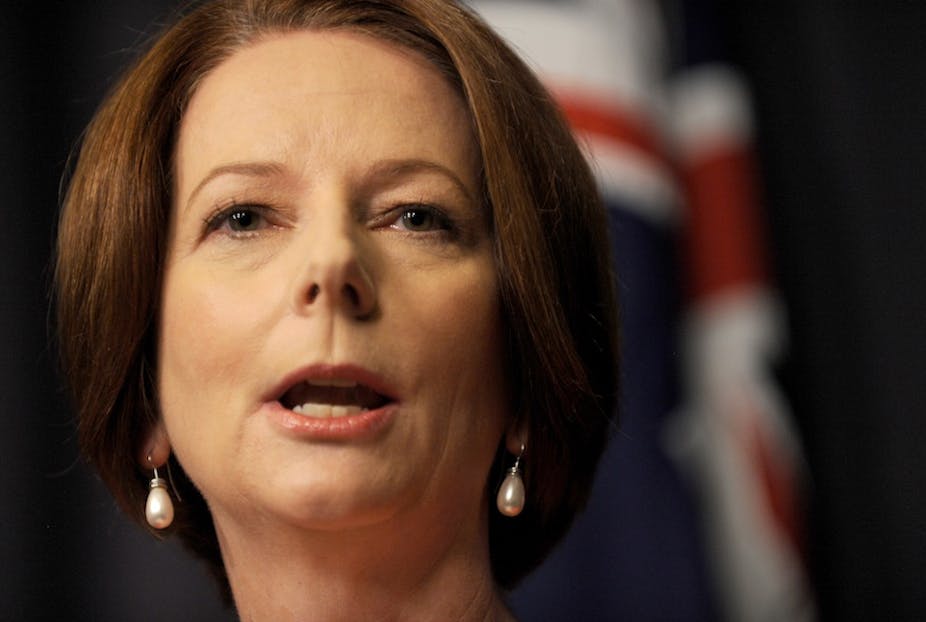From Kevin Rudd’s surprise resignation last week to this morning’s galvanising ballot, The Conversation has kept you up-to-date with analysis from Australia’s foremost academic political analysts.
Just in case you missed any must-read pieces, here is some of our best.
Anika Gauja, Lecturer, University of Sydney
While the contest between Gillard and Rudd has been played out over the last few days in an overwhelmingly public fashion, the actual mechanics of the leadership selection are by contrast, very private.
The procedures for the election of the party leader are contained in the Federal Parliamentary Labor Party Rules – a document that is not publicly available.
However, from the information that has made it to the public arena we are able to piece together an accurate picture of how the process works.
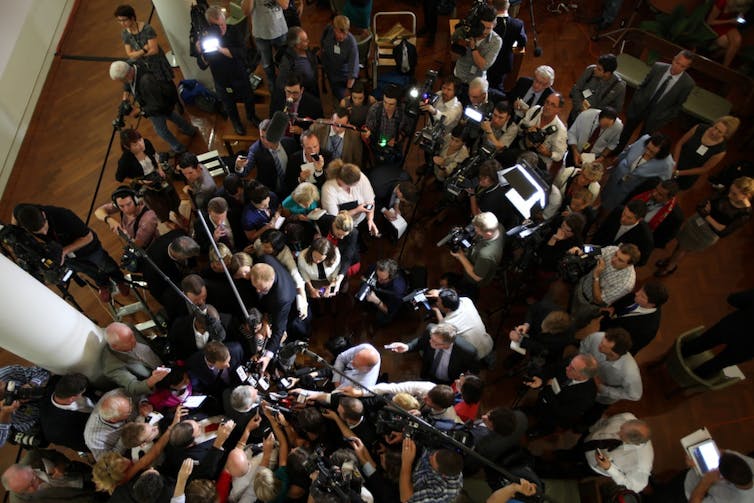
Glen Fuller, Assistant Professor of Communication and Journalism, University of Canberra
However important Kevin Rudd was to the 2007 election result, these conditions will not be repeated in any future election. Dissatisfaction is currently with the ALP government and direct action groups have mobilised against, not for, ALP policy in the form of opposition to the mining tax, pokie reform and the price on carbon.
Labor will have a serious problem regardless of the result of this morning’s leadership spill.
This much is obvious to most political commentators. Indeed, the Labor leadership stoush was a classic example of a political party acting in such a way as to lose enthusiasm, rather than the opposition political party working to produce it.
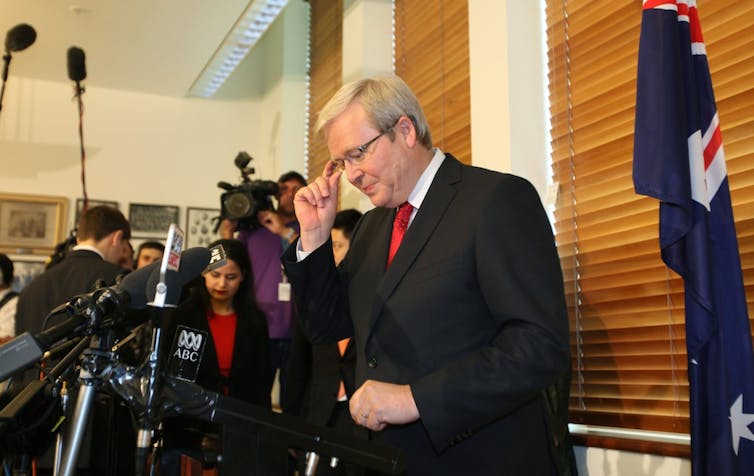
Robin Tennant-Wood, Assistant Professor in the Discipline of Government at the University of Canberra
To understand the significance of Rudd’s tactics, we need to look at Queensland politics generally. More than any other state, Queensland produces and celebrates populist politicians: tub-thumping Queenslanders who decry the treachery of the southern states and appeal directly to a long-held parochialism. Joh Bjelke-Petersen, Wayne Goss, Pauline Hanson, Peter Beattie, Bob Katter, Barnaby Joyce, and, yes, Anna Bligh and Kevin Rudd – the list goes on.
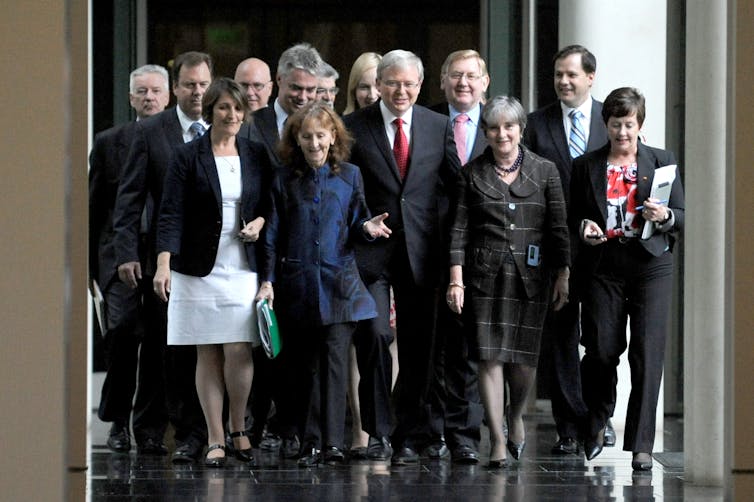
Chris Styles, Professor and Deputy Dean, Director Australian Graduate School of Management at University of New South Wales
What is interesting about the current situation in the Labor party is that unlike a commercial operation, the managers (caucus) are voting for their boss. The opinion polls tell us that the majority of “customers” (in this case the voters) rate him better than the alternatives. But the management team is not so keen on him, and they ultimately are the ones who decide.
In business it is often said that the customer is always right, but in this case their vote doesn’t count. This week’s soap opera has therefore become more about organisational leadership style than the ability to lead the country.
James Mahoney, Senior Lecturer in Public Relations, University of Canberra
The greatest curiosity of the Labor leadership brawl is Kevin Rudd’s “faceless men” line, which seems to refer to prominent parliamentary colleagues with very recognisable faces. But there is method in the way he is using it.

In a strategic communication sense, Kevin Rudd’s use of “faceless men” in recent days is a tactical message designed to support his long-standing argument against the faction leaders who now run the party. He is suggesting that faction leaders do their work well out of public view, including organising numbers for pre-selections, and leadership challenges. From that base his message is designed to trip the “faceless men” wire to detonate fear in Labor members, especially those who face a wipeout at the next election.
Geoffrey Robinson and David Lowe, Alfred Deakin Research Institute, Deakin University
Labor faces a dilemma because both the Rudd and Gillard models have proved wanting. Labor MPs are still aware of how quickly the euphoria of Kevin07 ebbed.
At one level, Rudd can be likened to Bob Hawke. Both leaders overwhelmed sceptical caucus colleagues by the force of their appeal to voters, but neither was a great parliamentarian. Both of their rivals, Paul Keating and Julia Gillard, were masters of the parliamentary game. In the 1980s, however, Hawke’s appeal was corporatist as well as populist. His government championed a partnership with social movements, in particular the trade unions.
Rudd definitely lacked Hawke’s interpersonal skills, but Australian society has radically changed from the 1980s. In an individualised society in which the base for collective social action has declined, Rudd’s populism was detached from a social base. Once Kevin07 became a memory, Rudd’s appeal to a fickle electorate evaporated.
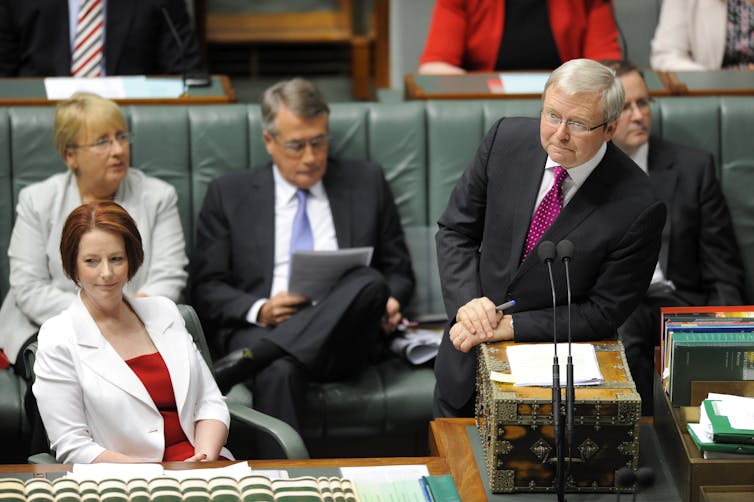
Norman Abjorensen, Visiting Fellow, Crawford School of Economics and Government at Australian National University
The fact the party kept Rudd within the tent was a major mistake. Those who had worked closely with him and who had deserted him well knew that he was incapable of working as part of a team, which was precisely why he had been deposed.
One has only to go back to the widely disseminated image of an ashen-faced Rudd, wallowing in visual self pity as he sat on the backbench after being deposed, to see that this was trouble in the making.

